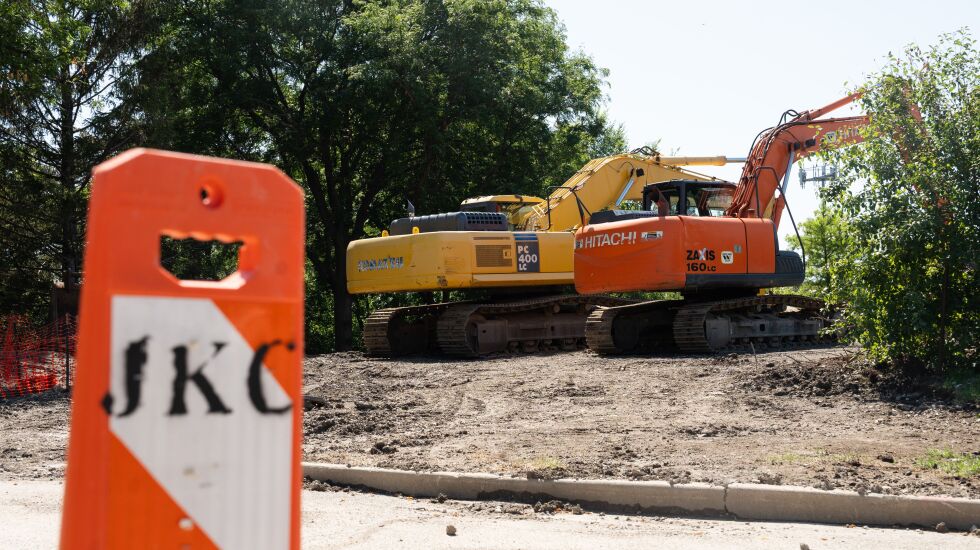
It’s been more than two years since the city of Chicago banned a Waukegan contractor from ever again being allowed to get or work on any city contracts.
That followed a City Hall investigation that found Joel Kennedy’s Joel Kennedy Constructing Corp. falsified records to make it appear it was meeting a requirement to have Chicago residents do at least half of the work on sewer projects.
The city’s ban of Kennedy and his company doesn’t apply, though, to other governmental bodies. So Kennedy’s company has continued to get contracts from other agencies, including the Metropolitan Water Reclamation District of Greater Chicago, which serves all of Chicago.
The sewage-treatment agency “does not abide by the city’s debarment list,” spokeswoman Allison Fore says.
Kennedy is replacing the water reclamation district’s sludge pipeline that runs along the Skokie Northshore Sculpture Park under a $27.5 million contract that the agency’s elected commissioners awarded his company last year over objections from three commissioners.

“I didn’t believe we should be giving a contract to a firm with a history of fraud,” Commissioner Cameron Davis says. “It’s not in the public interest.
“They bid lower than anybody else,” Davis says. “What good is having a low bidder if there’s a history of fraud?”
Kennedy says his son Ryan Kennedy now runs the company. And Ryan Kennedy says it’s eligible to work for every government agency in Illinois except the city of Chicago.
The company has landed contracts with municipal governments including those of Evanston, Carpentersville and Gurnee, in some cases on projects that are funded with grants or loans from the Illinois Environmental Protection Agency.
“It’s been a difficult stretch for the last five years,” Ryan Kennedy says. “We haven’t worked in the city for five years. We’re a different company than we were at that time.”
Kennedy began getting city contracts in 1994 under Mayor Richard M. Daley. Altogether, Kennedy got 32 city contracts to repair sewer mains and install water mains, billing City Hall more than $295 million by 2018.
Kennedy’s problems with the city began in 2017, when Angelo Milazzo, a former company president, filed a sealed whistleblower lawsuit accusing the business of violating the Chicago Residency Ordinance. That requires that city contractors hire Chicago residents to perform at least half of the work on any construction project of $100,000 or more. Milazzo said in the lawsuit that Kennedy violated the ordinance on four contracts for $156 million in water main construction and nearly $6 million in sewer improvements, all on the North Side and Northwest Side.
Milazzo’s suit led to an investigation by the city inspector general’s office that found that Kennedy’s company had provided City Hall with falsified payroll records on those four construction projects and two others by either deleting the names of employees who lived in the suburbs or falsely saying those suburban workers lived at specific city addresses.
The investigation led by then-Inspector General Joseph Ferguson found that “the contractor’s fraudulent scheme misrepresented over 70,000 labor hours across four contracts.”
Ferguson, who no longer holds that office, says city agencies had “neither the resources nor the technological capacity” to verify the addresses of workers listed on Kennedy’s payroll records. He suggests having City Hall require digital identification cards for contractors’ employees.
“It can be done,” Ferguson says. “It simply hasn’t been a priority for the city. If we’re going to have these requirements, it should come with an auditing process. If you want it to be understood that it’s a priority of yours, you should make sure the mandates are adequately funded.”
Asked about doing that, Mayor Brandon Johnson’s spokeswoman Kristen Cabanban says the city Department of Procurement Services “monitors compliance at every stage of the contract cycle on construction contracts. Compliance efforts include site visits and employee interviews to confirm employment status, wages and residency.”
Former Mayor Lori Lightfoot’s administration banned Joel Kennedy and his company on April 16, 2021.
Kennedy said then that he would sue to challenge the legality of requiring that Chicago residents perform half of the work on construction projects but says he’s not planning to do that “at this time.”
Kennedy and the city settled the federal lawsuit last December. Under that agreement, Kennedy must pay the city $2,580,989 by July 2026, which included $580,989 the city owed the construction company from sewer contracts. And Milazzo — whose lawyer won’t comment — will get 15% of what Kennedy owes the city. So far, Milazzo has been paid $85,135.







